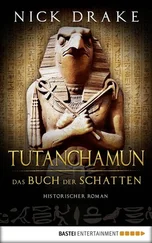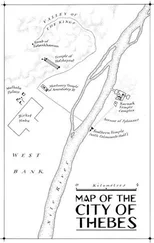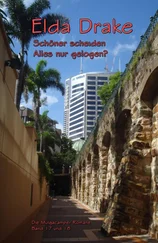Nick Drake - Nefertiti
Здесь есть возможность читать онлайн «Nick Drake - Nefertiti» весь текст электронной книги совершенно бесплатно (целиком полную версию без сокращений). В некоторых случаях можно слушать аудио, скачать через торрент в формате fb2 и присутствует краткое содержание. Жанр: Исторический детектив, на английском языке. Описание произведения, (предисловие) а так же отзывы посетителей доступны на портале библиотеки ЛибКат.
- Название:Nefertiti
- Автор:
- Жанр:
- Год:неизвестен
- ISBN:нет данных
- Рейтинг книги:5 / 5. Голосов: 1
-
Избранное:Добавить в избранное
- Отзывы:
-
Ваша оценка:
- 100
- 1
- 2
- 3
- 4
- 5
Nefertiti: краткое содержание, описание и аннотация
Предлагаем к чтению аннотацию, описание, краткое содержание или предисловие (зависит от того, что написал сам автор книги «Nefertiti»). Если вы не нашли необходимую информацию о книге — напишите в комментариях, мы постараемся отыскать её.
Nefertiti — читать онлайн бесплатно полную книгу (весь текст) целиком
Ниже представлен текст книги, разбитый по страницам. Система сохранения места последней прочитанной страницы, позволяет с удобством читать онлайн бесплатно книгу «Nefertiti», без необходимости каждый раз заново искать на чём Вы остановились. Поставьте закладку, и сможете в любой момент перейти на страницу, на которой закончили чтение.
Интервал:
Закладка:
‘The Great Aten Temple, which is kept for exceptional festivities.’
‘Where am I to meet the King?’
‘My instructions are to bring you to the Great Palace but to show you the Small Aten Temple first.’
‘Houses, palaces, temples; great this, small that. It is confusing, isn’t it? What’s wrong with how things used to be?’
Khety nodded again, uncertain how to respond. Tjenry grinned. I grinned back.
Up ahead I could see the river of people and their shadows heading towards the great pylons of the temple, six of them arranged in pairs through the heart of the building, dazzlingly white. Streamers of multicoloured cloth drifted elegantly in the river breeze from their high poles as if they had all the time in the world. Unfinished hieroglyphs covered the stone facades of the pylons, illuminated gold by the setting sun. I struggled to read some of them, but I have never been good at this. Then we passed between the central pylons, jostled stiffly by the human stream that narrowed through the guard gate under another carving of the Aten, then bunched, hustled and distributed itself out into an open courtyard with colonnades on each side. The people dispersed expertly to their offices and appointments. Sunset is an important time of prayer, in these days more so than ever before.
But this was a temple unlike any other I had seen. The great dark stone temples at Karnak are labyrinths lit by a few spots of intense white light, leading to ever more obscure chambers, all ensuring the god is kept perpetually hidden deep in the shadowy heart of his House, away from the ordinary light of the world and its teeming temporal worshippers. This was deliberately designed to be exactly the opposite, wide open to the air and the sun. Vast walls were decorated with thousands of images in panels and sections, almost all of them, as far as I could see, depicting Akhenaten, Nefertiti and their children worshipping the Aten. And the whole space was filled with hundreds of altars, arranged in rows, and all around the walls. At the back were chapels, again filled with altars. In the centre a main raised altar, surrounded by lotus-shaped incense burners, was piled high with food and flowers from both Upper and Lower Egypt. How clever to unite the offerings of the Two Lands in the one altar, and how ostentatious in our time of trouble. And everywhere one looked were statues, in all sizes, of Akhenaten and Nefertiti, looking down at their subjects not with the distant stare of official power, but with lively human faces, perfectly carved in the limestone, their hands intertwined or raised, cupped, to receive the divine gifts of the sun that on this evening, as every evening, were streaming down to them from a real sky. And people stood still, eyes wide open, their hands holding up offerings to the light: flowers, food, even occasionally babies.
I looked down at my own hands and saw that they were gilded by the warm evening light.
‘“Since he casts his rays on me, bestowing life and dominion for ever and eternity, I shall make Akhetaten for the Aten, my father, in this place,”’ Khety recited, and he smiled. ‘The god is everywhere with us.’
‘Except at night.’
‘The god sails the darkness of the Otherworld, sir. But he always returns, reborn to a new day.’
‘Speaking of which, should we not now continue to the appointment?’ said Tjenry, amusingly bored by the spectacle of the worship.
They led, and I followed, through the crowds.
Whether or not this was the deliberate intention, I was disorientated by the experience of the new temple and its worshippers. Yes, one hears about the new religion, and how we must now worship the sun disc, with our arms raised. Yes, one discusses its pros and cons. Yes, one has to consider one’s position and one’s future. For some it is a matter of life and death while for most of us it is a question of doing what is required and getting on with our lives. But now I do not know what to think. Standing in the sun has never been a wise thing to do.
We turned back out of the temple, left onto the Royal Road, and soon found ourselves outside the Great Palace. Connecting that complex to the King’s House was a great covered bridge, with square archways to allow traffic to pass beneath. And in the centre, above the crowds, a large balcony.
‘The Window of Appearances.’
‘Ah.’
‘From where our Lord bestows gifts.’
‘Have you received gifts, Khety?’
‘This collar, sir. It is of fine workmanship. And the materials are excellent.’
He fingered the gold thread and azure beads. It wasn’t nearly as fine as the one worn by Mahu, but nevertheless a piece of beauty and worth.
‘You must have done great works to deserve such a gift.’
‘He’s very reliable, sir,’ said Tjenry, who wore no such collar.
‘I am faithful,’ said Khety.
They glanced at each other.
‘And here we are-the Great Palace,’ said Tjenry expansively, as if he owned the place.
8
We passed through the guard gate and into a vast courtyard that spread out in the direction of the river. The sight of its flowing evening colours, and the feminine orchestra of the water birds, revived my spirits. And above me, looking out to the river, towered yet more statues of Akhenaten and Nefertiti. A man and a woman carved as gods.
We turned right into an enclosed courtyard, and then right again into an antechamber. Beneath my feet I noticed pavements of painted scenes: beautiful waterways with fish and flowers, and stones and butterflies. We were approaching the heart of the palace, for more and more officials, men of status in fine white linens, passed us. They quickly assessed me, curiously, dispassionately and without warmth, as a stranger in the city. Clearly this was a place where everyone knew everyone but none were friends.
Khety spoke to an officer of the court. Tjenry gave me a quick and inappropriate gesture of encouragement, and then I was ushered alone into a private courtyard as into the cage of a lion. It was exquisitely beautiful. Shuttered panels carved with filigree patterns ran around the edges until they opened on the side of the river. A fountain played in a translucent bowl balanced over a long pool. Flowers and river ferns flourished, nodding gently. The cool shade served only to sharpen the outline of a figure who stood, framed by the shutters, on a wide balcony giving on to the great panorama of the river and the greater one of the sunset, apparently gazing deeply into the dazzling consort of lights, the water’s dance, that surrounded him. Then he turned to face me.
At first I could not make him out. ‘Life, Prosperity, Health,’ I said. ‘I offer myself to my Lord and to Ra.’ I kept my eyes lowered.
Finally he spoke: ‘We have need of your offering.’ His voice was clear and light. ‘Look up.’
He seemed to gaze upon me for a little while. Then he stepped carefully down and out of the last red light of the setting sun.
Now I could look at him properly. He was both like and unlike his images. His face was still quite young; long, slender and almost beautiful, with precise lips and intelligent eyes that conveyed absolute power: it was both hard to look into them and impossible to look away. It was a fluid, alive face, but also one I could imagine hardening in an instant into ruthlessness. His body was disguised under his clothes, and a leopard skin was cast over one shoulder, but I had the impression of a slender, refined physique. Certainly his hands were fine. A beautifully wrought crutch was tucked under his right arm. He seemed at once brittle, as if with one light tap he would turn to dust, and immeasurably powerful, like someone who has been smashed to pieces and then restored, the stronger for the shattering. A rare creature, not quite of this world. Something of beauty and something of the beast.
Читать дальшеИнтервал:
Закладка:
Похожие книги на «Nefertiti»
Представляем Вашему вниманию похожие книги на «Nefertiti» списком для выбора. Мы отобрали схожую по названию и смыслу литературу в надежде предоставить читателям больше вариантов отыскать новые, интересные, ещё непрочитанные произведения.
Обсуждение, отзывы о книге «Nefertiti» и просто собственные мнения читателей. Оставьте ваши комментарии, напишите, что Вы думаете о произведении, его смысле или главных героях. Укажите что конкретно понравилось, а что нет, и почему Вы так считаете.










